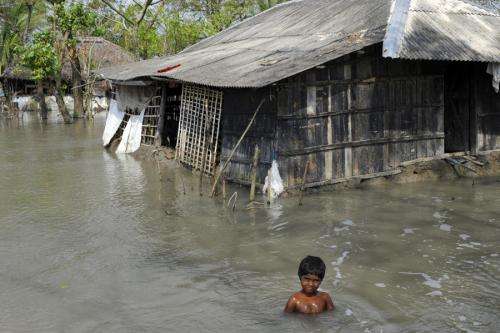Climate change refugees are our responsibility

Australia needs to plan for an influx of climate change refugees from neighbouring countries that face ever increasing risks from cyclones, rising sea levels and more severe droughts, according to a researcher at the University of Technology, Sydney (UTS).
Fears about waves of mass migration from climate change are unfounded, says the university's Elaine Kelly. But Dr Kelly, a UTS Chancellor's Post Doctoral Research Fellow, says Australia should start planning migration streams that include people who have lost their homes to climate change, in addition to those we already accept for other humanitarian reasons.
"The reality is climate change will provoke more displacement, and displacement of those who are most poor," says Dr Kelly. "How are we going to plan for that?"
The international community is now talking less about how to cut carbon dioxide (CO2) levels in the atmosphere and more about how to cope with the dramatic changes excessive amounts of CO2 will have on climate and temperatures, she says. One of the solutions is planned migration from those areas particularly vulnerable to the effects of climate change to less vulnerable places.
It is a major shift in thinking that has yet to be adopted by Australian politicians.
"We need to think about local, regional and international ways of regulating migration if we want to do it well," says Dr Kelly. "Australia needs to be involved in the [international] talks around climate change funding and how to initiate funds and implement these sorts of programs. But at the moment, we are withdrawing from those sorts of conversations," she says.
Dr Kelly argues that because climate change is increasing the pressure for people living in south-east Asia to migrate to safer regions, it is more important than ever that the debate about migration, and particularly about refugees, should be based on ethics rather than politics or national security.
In November, one of the strongest cyclones to hit the Philippines, Typhoon Haiyang, killed thousands of people and left millions homeless. A month earlier, in India, more than half a million people were evacuated from their homes before another cyclone hit. In May, one million people were evacuated as a cyclone hit Bangladesh, a country particularly vulnerable to cyclones and flooding.
Most climate change adaption will be local, says Dr Kelly. For example, migration from low-lying rural areas in Bangladesh to the capital, Dhaka, is expected to increase the city's population to 40 million by 2050 from 15 million today.
Dr Kelly has observed a sense of hospitality in the international refugee program for those suffering political persecution, a sense sorely lacking in Australia.
"Hospitality to affected countries from the industrial countries responsible for climate change must be seen as either a mode of adaptation or a form of compensation for profound losses and damages caused by climate change," she says.
"I would love to see a reasoned discussion of [the ethics of climate change] in Australia, one that isn't polemic and isn't driven by fear. I'd love to see a discussion that looks at the human issues and at the pragmatic approaches that government can take."
She also wants to see research conducted in communities that have welcomed migrants and regional communities that want more people.
"How can we develop and implement welcoming policies at that level? I'd love to see conversations happening at local levels and then putting pressure on members of parliament, and the state and federal governments to engage in the conversation."
Provided by University of Technology, Sydney

















